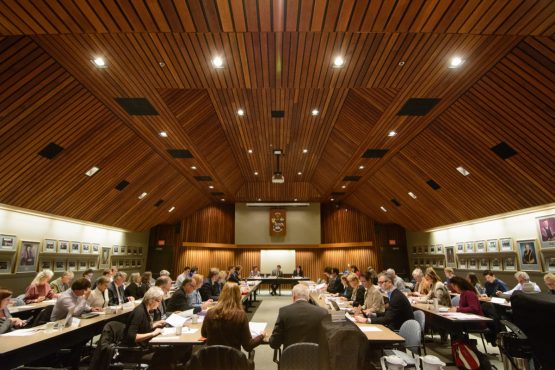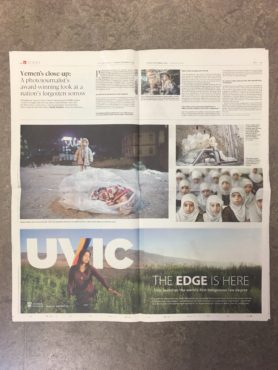
File photo of the Senate and Board Chambers, by Hugo Wong
The UVic Board of Governors gathered on Tuesday for the first meeting of the school year to discuss the recently-launched Indigenous Law degree program, new university infrastructure, and UVic’s reputational advancement project.
University President Jamie Cassels was optimistic with regards to university enrollments, citing a 4-5 per cent increase in applications this year.
“Both domestic and international applications were way up … despite fairly hefty increases in the GPA requirement for admissions,” he said.
Cassels clarified that he was not celebrating enrollment numbers alone, and noted “It’s not about volume,” but continued by saying, “we are more in demand than we’ve ever been — our students are increasingly coming from further afield, [with] more than 75% of our students now [coming] from outside of this immediate catchment area.”
Victoria is the third most expensive city for housing in Canada, Cassels pointed out, saying that “If we want to be a destination university, we have to provide better and more housing opportunities for our students.”
Cassels explained that the university’s reputation is critical to attracting talented faculty and staff, creating effective partnerships, and demonstrating to potential funders and philanthropists that UVic is a good place to invest.
In regards to recent positive advancements for the university, Cassels listed the expansion of the engineering and computer science programs, collective bargaining agreements for university employees, the Indigenous law program, and graduate scholarship funding, before moving towards the meeting’s primary topic of discussion: the university’s reputational advancement project.
Cassels mentioned he hadn’t yet had the chance to see the UVic advertisement in the Sept. 25 issue of the Globe and Mail yet. Someone pulled out a copy and passed him the page with the advertisement.
“That looks pretty good,” he said of the advertisement.

The advertisement in the Globe and Mail that was brought up during the Board of Governors meeting.
However, Cassels reminded the Board that the reputational advancement project was not a vanity project.
“Communications and reputational advancement … it’s not because we want to feel good about ourselves and just hear people say nice things about ourselves,” he said. “The value of the UVic degree — the quality of the credential — is directly related to the reputed quality of the institution.”
Cassels went on to explain that the university’s reputation is critical to attracting talented faculty and staff, creating effective partnerships, and demonstrating to potential funders and philanthropists that UVic is a good place to invest.
“It’s a very important part of developing the capital that we need to continue being successful as a university,” he said, before handing speaking rights over to Carmen Charette, Vice-President of External Relations for UVic.
Charette spoke more specifically to the university’s efforts in assessing the impacts of the reputational enhancement project.
“It’s not the easiest thing to do because there’s many things that come and contribute to this, but I have a bit of data,” she said, citing a number of UVic’s different online campaign landing pages that received between 9 000 and 11 000 unique visits last year.
Charette said that the increase in traffic of the “Why study at UVic” page on the university’s website increased by 83 per cent, while the number of applications from the lower mainland of B.C. rose by 4.2 per cent over the last year.
“We can’t attribute that all to the campaign, but it’s again one piece of the many strategies that we use to do that,” she said.
Charette proceeded to pass around UVic’s advertisement in the Globe and Mail, which was met with murmurs of approval around the room.
Charette mentioned the advertising campaign that was launched the same day as the Board meeting, that will see advertisements in newspapers — such as the one in the Globe and Mail — airports, magazines, on news sites and in e-newsletters, videos on social media channels, and stories and op-eds in print and online.
Cassels reminded the Board that the reputational advancement project was not a vanity project.
“You’ll see that we’ve picked two themes,” said Charette, on the advertising campaign. “Ocean climate and Indigenous law, languages, and economic development.”
“As Jamie said, a lot of [positive feedback] is anecdotal,” she said. “I was in Vancouver last week and people [were] telling me how awesome [our campaign] is, even some of our sister universities think we’re doing a great job, so we’ll try to keep it that way.”
Following Charette’s update, David Zussman provided the report from the Finance Committee, stating that the university’s expenditures were expected to increase.
“You’ll recall that at our March 2018 Board Meeting we approved a budget of $370 million as a base, and in this report we report on some new expenditures that are now projected to increase by $18.9 million,” said Zussman.
Zussman noted that the expenditures will be partially compensated by two sources — funding from the provincial government ($5.2 million), and money raised from last year’s student fee increases ($4.8 million).
Concluding his report, Zussman drew everyone’s attention to the $2.3 million dollars in the budget dedicated to student financial assistance.
Next came a report from Michael Mitchell on behalf of the Committee of Operations and Facilities.
“The exciting stuff at last,” said Mitchell, speaking about the university’s policy on cannabis. However, there was little information currently available.
“We received a great update actually on the development of the university’s policy in connection with the airways on campus to be designated for cannabis smoking,” he said. “Additional information and education on policies will be provided … prior to Oct. 17 [Canada’s legalization date].”
Following a brief update from Daphne Corbett speaking to some logistical details regarding executive and governance of the Board, the board moved to adjourn.
The next UVic Board of Governors meeting will be held in the Senate and Board Chambers of the University Centre building at 11 a.m. on Nov. 27.
The next UVic Senate meeting will be held in the Senate and Board Chambers of the University Centre building at 3:30 p.m. on Oct. 5.







